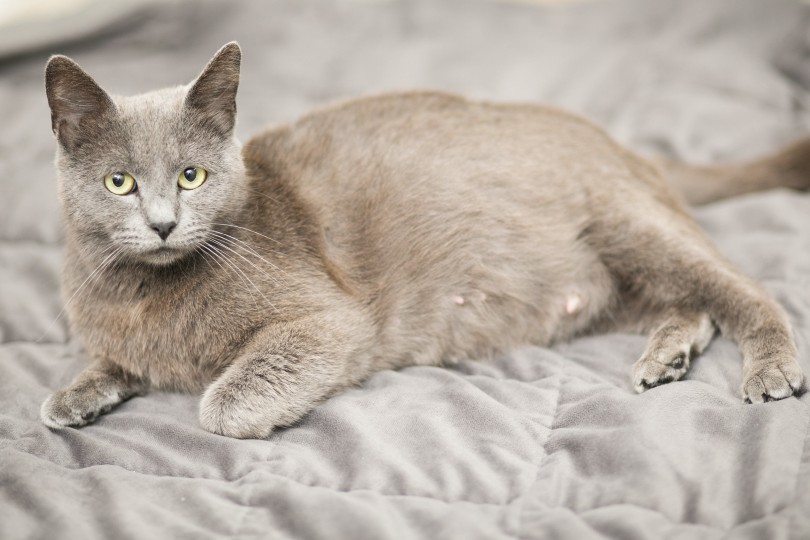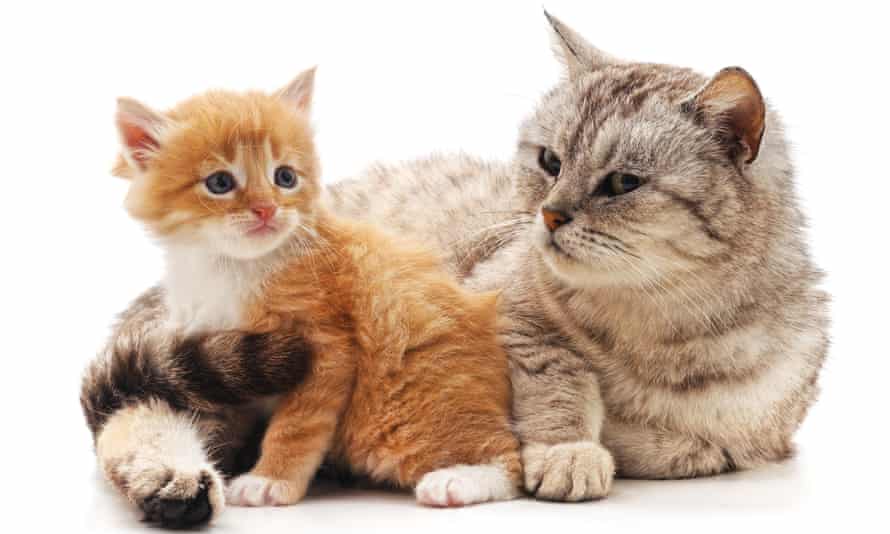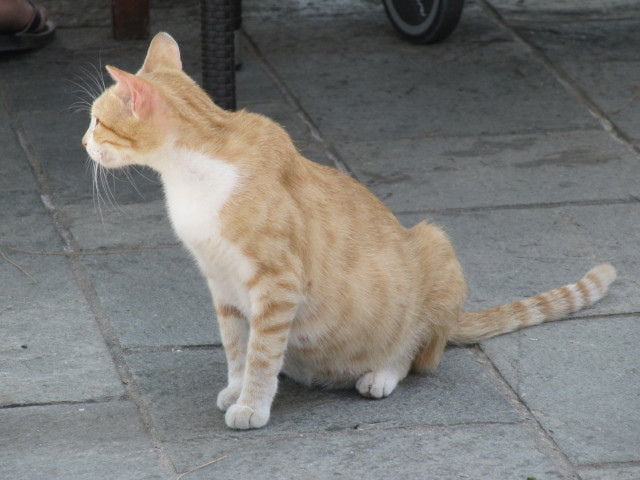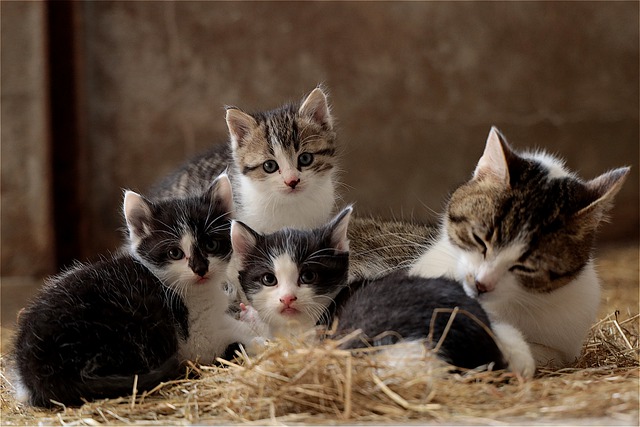Cats are some of the most fertile animals. If you’ve owned a few unsprayed female kitties in your life, you can attest to this.
As soon as your girl is six months old, the heat cycles begin to happen.
One minute she will be on heat, making meowing sounds and rolling on the floor. Next minute, she’ll be pregnant and nursing.
When you think she is taking a break from reproducing, she will display the same symptoms of pregnancy all over again. This can happen even when nursing her latest litter.
Mother Nature tasked her with the responsibility of keeping the species going.
If you suspect that your nursing feline friend is pregnant again, chances are she is. Pregnancy in cats can sneak up on even the most experienced pet parents.
As long as the kitty goes on heat and mates, pregnancy almost always happens.
So, how do can you tell whether your nursing cat is pregnant again or not? Here’s a detailed guide to help answer the question.
Frequency of Pregnancy in Cats

According to VCA Hospitals, female cats or queens go on heat plenty of times a year.
Due to this, they are referred to as polyestrous which is a fancy word that means going into estrus multiple times a year.
Estrus (being on heat) lasts about three weeks. If a cat doesn’t get pregnant in one heat cycle, it will be less than a month before she’s back on it once more. This means that a queen can get pregnant several times a year.
Some reports claim that an unsprayed kitty can get up to five litters a year if given a chance. This can happen as early as four months of age and continue to the end of life.
That’s right – our feline friends do not reach menopause like we do.
Related Post: How Many Times Can A Cat Get Pregnant In A Lifetime?
Can A Queen Get Pregnant While Nursing?

Many cat owners don’t keep a close eye on their unspayed queens during the nursing period. The reason is that they think that a nursing cat cannot get pregnant.
With all the hormones raging in her body, how does she get on heat in the first place?
Plus, her little body just birthed multiple kittens. Surely, she is not ready to go through that again!
Well, if you think like this, you’d be shocked to learn that a queen can carry the young even while nursing. Turns out nursing has little to no effect on her heat cycle.
For humans, nursing hormones suppress fertility for a while. Not the case for queens. If a nursing cat goes into estrus and mates, she may get pregnant.
Luckily, queens are overwhelmed with caring for kittens during the first few weeks of birthing them. They are constantly nursing, cleaning, and bonding with the young.
However, in a few weeks, the kittens will start leaving mom to explore their surroundings.
Mommy will take this as her cue to go out there and mate. This is when things can take a huge turn for her.
Related Posts: Do Cats Get Pregnant Every Time They Mate?
How to Tell If a Nursing Cat Is Pregnant Again

Just because you notice your nursing queen getting plumper than usual doesn’t necessarily mean she’s pregnant again.
Perhaps she’s packed extra pounds because of eating more.
Maybe she has an infection of sorts that’s changing her appearance.
To know for sure she’s pregnant, watch out for the following symptoms.
1. Weight Gain
One of the tell-tale signs of a pregnant queen is extra weight.
Under normal circumstances, expectant cats gain anything from 2-4 pounds throughout their pregnancy journey.
It might sound insignificant to you but to a 5-pound cat, this is easily noticeable.
Again, sometimes cats gain weight during the nursing period as they up their food intake.
This is to say that weight gain alone may not sufficiently point you in the right direction with regard to pregnancy.
Still, it is worth watching out for.
Related Post: Why Is My Cat So Big?
2. Pinking Of the Nipples
Ideally, a pregnant cat features swollen and pink nipples.
But for a nursing cat, the nipples are already swollen.
However, they may not appear as pink as those of a pregnant cat.
If your cat lets you near her, check out the color of her nipples. If they have a different color from what you are used to, chances are she’s pregnant again.
3. Distended Abdomen
While a growing belly may not show immediately, it does become apparent after about five weeks of pregnancy.
At about this time, the kittens in her belly will have grown much larger.
Take a closer look at the queen and watch out for a distended belly. If it is present, it could very well be that she’s expecting again.
4. Changes in Behavior
Another big thing to look out for is a change in your queen’s behavior.
Pregnancy can take a toll on a kitty. It can make her want to sleep more, have reduced levels of energy, or kill any desire to move.
Some queens seek extra attention from their owners at this time. If they have kittens, they will leave them over long periods to seek you out.
Others roll on the ground and vocalize more.
Related Posts:
5. Changes in Appetite
Certain kitties will refuse to eat all of a sudden. Others will take the opposite direction and eat more and more as the days go by.
In case you are not aware, some queens get morning sickness during their early days of pregnancy. That can affect their eating habits a great deal.
6. Feel the belly
For experienced cat owners, feeling your kitty’s belly can tell you whether she’s with child or not.
Simply grab her and press gently on her belly.
Feel for any hard surface that may signify a fetus or several of them.
Keep an open mind here. Sometimes these tests are inaccurate.
7. Ultrasound and X-Rays
To be absolutely sure that your fur baby is pregnant again, you might want to have her checked by the vet.
They will do an x-ray or an ultrasound on her and see if there are fetuses in her little uterus.
The former can be done after 16 days and the latter after 42 days of pregnancy.
Closing Thoughts
Pregnancy and giving birth demand a lot from a queen. Her body goes through a lot.
Taking care of the young is in itself a huge task. Add this to a new set of litters and you know that a nursing cat shouldn’t get pregnant so soon.
If you find out that your fur baby is yet to be a mother again, visit the vet. In case you are planning to have her spayed, now would be a good time.
For queens with very young kittens, termination of the pregnancy is a good option to consider.
Related Posts:
How to Stop a Cat in Heat from Meowing (9 Simple Ways)
17 Herbal Remedies for Cats in Heat
Why Is My Cat Leaving Tiny Blood Spots On The Floor (or Sink)?

Hi! I am Eleanor Price. I started this website after my cat, Louie, almost died from a case of botulism (a type of food poisoning often caused by bacteria that grow on food items). Turned out that my cat’s diet was the problem. I have made it my duty to provide the best information and recommendations about everything cat lovers need to know about their felines’ health and wellbeing. My goal is to find the most informative content on anything feline-related and share it with fellow hardworking kitty lovers.

